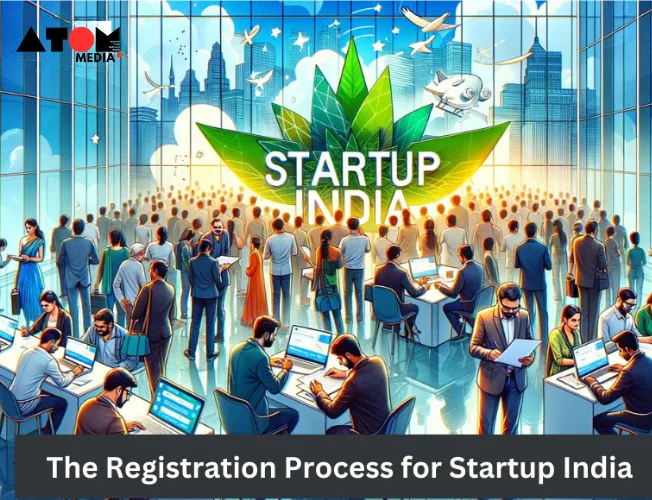India has emerged as a hotbed of entrepreneurship, with a robust startup ecosystem ranked third internationally. As of May 2023, the country had over 90,000 companies, including 107 unicorns valued a whopping $30 billion. Recognizing this potential, the Indian government, led by Prime Minister Narendra Modi, launched the Startup India initiative. This project intends to foster innovation and empower potential entrepreneurs by shortening the startup registration procedure.
Breaking Down the Steps: A 5-Point Guide
For young entrepreneurs eager to turn their ideas into reality, registering their startups in India has become more streamlined than ever. Here’s a breakdown of the five key steps involved:
1. Business Incorporation: The Foundation
The initial step requires incorporating your business as a Private Limited Company, a Limited Liability Partnership (LLP), or a partnership firm. This involves submitting an application form to the Registrar of Firms (RoF) or the Registrar of Companies (RoC) along with the necessary fees and documents. These documents typically include a Memorandum of Association (MoA) for companies or a Partnership Deed for LLPs and partnerships.
2. Startup India Registration: Joining the Community
Once your business is incorporated, it’s time to register it on the official Startup India website (startupindia.gov.in). This online portal serves as a one-stop shop for startups, offering access to various resources and programs. By registering, you create a Startup India profile, enabling you to explore opportunities such as:
- Acceleration and Incubation Programs: These programs provide mentorship, funding assistance, and networking opportunities to help startups grow and scale.
- Competitions: Participating in government-backed or private competitions can gain valuable exposure and potential funding for your startup.
- Other Resources: The Startup India portal offers access to a wealth of information, including government schemes and policies specifically tailored to startups.
3. Obtaining DPIIT Recognition: Unlocking Benefits
The Department for Promotion of Industry and Internal Trade (DPIIT) recognition grants your startup access to a range of benefits and support mechanisms. These include:
- Intellectual Property Services and Resources: The DPIIT facilitates access to intellectual property (IP) protection and support services, crucial for safeguarding your innovative ideas.
- Self-Certification under Labor Laws and Environmental Laws: This simplifies compliance procedures by allowing startups to self-certify their adherence to specific labor and environmental regulations.
- Access to Funds: DPIIT recognition can improve your startup’s chances of securing funding from government schemes, venture capitalists, or angel investors.
- Tax Exemptions: Startups with DPIIT recognition may be eligible for tax benefits, such as tax breaks on income tax and capital gains.
To obtain DPIIT recognition, log in to your Startup India account and navigate to the “Schemes and Policies” section. You’ll find an option to submit your application for recognition as a startup.
4. Completing the Recognition Application Form
The next step involves filling out the detailed Startup Recognition Form on the Startup India website. This form typically gathers information about your startup, including:
- Full Office Address: Ensure you provide the complete and accurate address of your startup’s registered office.
- Authorized Representative Details: Specify the details of the individual authorized to represent your startup in official capacities.
- Partner/Director Details: Provide information on all partners or directors involved in the startup.
- Startup Activities: Clearly define the core business activities and objectives of your startup.
- Self-Certification: This section involves self-certifying your startup’s adherence to relevant laws and regulations.
5. Receiving the Registration Certificate: The Final Step
Once you have submitted the application form, the authorities will verify the information you provided. After successful verification, you will receive an email with a digital registration certificate. This certificate, issued by the Department for the Promotion of Industry and Internal Trade, formally recognizes your startup.
Documents Required for Startup Registration
The documents required for startup registration in India may vary slightly depending on the chosen business structure. Here’s a general checklist to ensure you have everything in order:
- Incorporation/Registration Certificate: This document serves as proof of your business’s legal existence, issued by the RoC or RoF.
- PAN Number: Every registered business in India requires a Permanent Account Number (PAN) for tax purposes.
- Proof of Funding (if applicable): If your startup has received any funding, provide documents such as investment agreements or bank statements as proof.
- Authorization Letter (if applicable): For LLPs and partnership firms, an authorization letter from the designated representative is required.
- Proof of Concept (optional): While not mandatory, presenting a pitch deck,
Read more: Marketing News, Advertising News, PR and Finance News, Digital News





